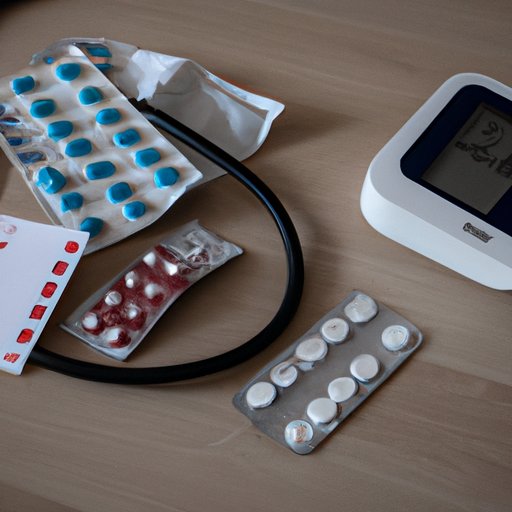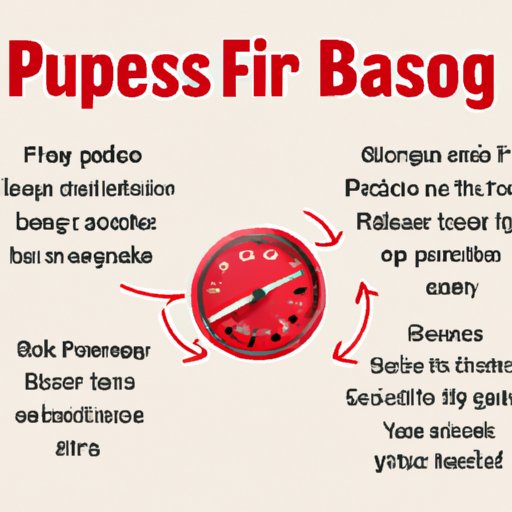
Introduction
Hypertension, otherwise known as high blood pressure, occurs when the force of blood flowing through your arteries is too high, which can cause health complications. Medications used to manage hypertension work by reducing blood pressure, and while they are effective, they can also generate certain side effects. One of the most common side effects is fatigue, which affects an individual’s energy levels, focus, and concentration. Fatigue is the feeling of sluggishness, tiredness, or weakness that makes it challenging to engage in daily activities.
The Science Behind Fatigue Caused by Blood Pressure Medication
The cause of drowsiness due to blood pressure medication is often linked to the medication’s mechanism of action. Blood pressure medication helps reduce blood pressure by dilating the blood vessels, allowing blood to flow more efficiently at a slower rate. While this is beneficial, it can also cause a drop in blood pressure, leading to fatigue. This occurs when there isn’t enough force to deliver oxygen to the brain and muscles.
Another contributing factor is the medication’s ability to relax muscles, leading to drowsiness and muscle weakness. Additionally, some medications can cause dehydration, and this can cause an electrolyte imbalance and fatigue.
The Top 3 Blood Pressure Medications Known to Cause Fatigue
While different blood pressure medications can cause drowsiness and fatigue, some are more likely to cause these side effects than others. Here are the top three blood pressure medications known to cause fatigue:
1. Beta-Blockers
Beta-blockers are medications that reduce blood pressure by blocking the effects of adrenaline, a hormone responsible for increasing heart rate, breathing, and blood pressure. Beta-blockers also dilate blood vessels, reducing blood pressure and opening up arteries to improve blood flow. Common side effects of beta-blockers include fatigue, dizziness, and nausea. These side effects often pass after several weeks of taking the medication.
2. ACE Inhibitors
ACE inhibitors work by preventing the production of a hormone called angiotensin that can cause blood vessels to constrict. ACE inhibitors can cause side effects such as drowsiness, fatigue, and an irritable cough. These side effects occur because ACE inhibitors lower the blood pressure, and less blood flows to the brain.
3. Calcium Channel Blockers (CCBs)
CCBs are medications that relax the blood vessels, improving blood flow and lowering blood pressure. They can cause drowsiness, weakness, and fatigue, especially when an individual takes high doses. This medication’s side effects are due to a reduction in the force of blood flow in the brain, leading to fatigue and drowsiness.
Why Your Blood Pressure Medication May Be Making You Tired – And What You Can Do About It
Several factors can contribute to fatigue caused by medication. These factors include medication dosage, exercise levels, the quality of sleep, diet, and hydration levels. Here are some tips and strategies to manage fatigue caused by blood pressure medication:
1. Optimize Medication Dosages
If your medication dosage is too high, this can worsen fatigue and drowsiness. Speak with your doctor to ensure that you’re getting the right dosage.
2. Stay Active
Try to engage in moderate exercise for at least 30 minutes every day. Exercise can enhance blood flow to the muscles, reduce fatigue, and enhance overall energy levels.
3. Improve Your Sleep Quality
Get at least six to eight hours of sleep every night. Create a comfortable sleep environment, and avoid stimulants such as caffeine before bed.
4. Stay Hydrated
Drink plenty of fluids, including water and low-sugar fruit juices, as dehydration can cause fatigue.
5. Modify Your Diet
Eat a balanced diet with plenty of fruits, vegetables, and lean proteins, and reduce your salt intake as this affects your blood pressure levels.
The Connection Between Blood Pressure Medication and Daytime Drowsiness: A Comprehensive Guide
Daytime drowsiness is a common complaint among individuals taking blood pressure medication. It can be particularly challenging to manage, especially if you need to stay alert and focused during the day. Here are some tips for managing daytime drowsiness:
1. Take Your Medication at Night
If your medication makes you feel drowsy, ask your doctor if taking it at night is an option. This timing can help reduce daytime drowsiness.
2. Try to Stay Active
Engage in moderate exercise or stretching activities during the day to stimulate your brain, prevent fatigue, and help you stay alert.
3. Take Short, Frequent Breaks
Break up your workday or sitting in any one position with brief 5-minute walks or stretch breaks to improve blood flow to the brain and reduce drowsiness.
5 Ways to Combat the Fatigue Caused by Blood Pressure Medications
Here are some helpful strategies to minimize fatigue caused by blood pressure medication:
1. Practice Mindfulness and Relaxation Techniques
Mindfulness and relaxation techniques can help to reduce stress levels, lower blood pressure and support overall well-being.
2. Build a Support Network
Having supportive friends and family can help you feel more energized and motivated. Social support is key to maintaining emotional and mental health.
3. Use Caffeine in Moderate Amounts
Caffeine is a stimulant that can help promote alertness in moderation. However, excessive amounts can lead to dehydration and worsen fatigue.
4. Find Ways to Reduce Stress
Stress can worsen fatigue and drowsiness. Identify stress triggers and find healthy ways to manage them, such as deep breathing exercises, talking to someone, or taking a break.
5. Consult with Your Doctor
If you continue to experience fatigue despite implementing these strategies, consult your doctor. They might recommend modifying your medication, switching to a different medication, or adding a supplement to your regimen to boost energy levels.

Fatigue Related to Blood Pressure Medication: Tips and Tricks to Stay Alert and Energized
Here are some additional tips to increase energy levels and stay alert during the day:
1. Incorporate Superfoods in Your Diet
Superfoods are a great source of energy. Consider incorporating foods like berries, nuts, whole grains, and leafy green veggies into your diet to increase energy levels.
2. Stay Productive
Find activities that you enjoy and that leave you feeling productive, such as completing a puzzle or engaging in a fun DIY project. This can enhance your energy levels and boost your mood.
3. Take Short, Refreshing Naps
Short naps, ideally between 20-30 minutes, can help quickly boost your energy levels and enhance alertness.
How to Decide if Tiredness from Blood Pressure Medication is Worth the Health Benefits
While blood pressure medication is essential to manage hypertension, it’s natural to question whether the benefits outweigh the side effects, such as fatigue. Here are some factors to consider when deciding whether to continue medication despite persistent tiredness:
1. The severity of Your Hypertension
Discuss with your doctor about the risks and benefits of stopping your medication. If stopping blood pressure medication can result in worsening hypertension, it may not be worth the risk.
2. The Availability of Alternatives
Ask your doctor about alternative blood pressure medications that don’t cause drowsiness.
3. Your Daily Routine and Activities
Consider whether the fatigue is significantly affecting your daily routine and activities. Based on this, you can discuss with your doctor whether dosage adjustment or alternative medications are necessary.
Conclusion
Fatigue and drowsiness related to blood pressure medication can be challenging, but they are manageable. By following the tips and strategies outlined above, you can effectively manage fatigue while continuing to manage hypertension. Speak to your doctor to ensure that you’re getting the right dosage and that your medication is right for you.





